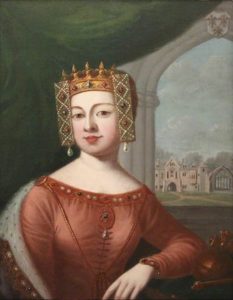
Queen Philippa
*Philippa of Hainault was born on this date in 1310. She was the first African Queen of England.
Philippa was of Moorish ancestry, born in Valenciennes in the County of Hainaut in the Low Countries of northern France. Her parents were William I, Count of Hainaut, and Joan of Valois, Countess of Hainaut, granddaughter of Philip III of France. Philippa was one of eight children and the second of five daughters and became the wife of King Edward III. Her eldest sister Margaret married the German King Louis IV in 1324, and in 1345, she succeeded their brother William II, Count of Hainaut, upon his death in battle.
Philippa married Edward at York Minster on January 24, 1328, eleven months after he acceded to the English throne. Unlike many of her predecessors, Philippa did not alienate the English people by retaining her foreign entourage upon marriage or bringing many foreigners to the English court. As Isabella did not wish to relinquish her status, Philippa's coronation was postponed for two years. She eventually was crowned queen on March 4, 1330, at Westminster Abbey when she was almost six months pregnant, and she gave birth to her first son, Edward, the following June.
In October 1330, King Edward commenced his rule when he staged a coup and ordered the arrest of his mother and Mortimer. Shortly afterward, the latter was executed for treason, and Queen Dowager Isabella was sent to Castle Rising in Norfolk. She spent several years under house arrest, but her privileges and freedom of movement were later restored to her by her son. Of her children, Phillipa outlived nine of them. Three of her children died of the Black Death in 1348. Edward, the Black Prince, was the eldest of her fourteen children, who became a renowned military leader.
A medieval writer, Joshua Barnes, said, "Queen Philippa was a very good and charming person who exceeded most ladies for the sweetness of nature and virtuous disposition." Chronicler Jean Froissart described her as "The most gentle Queen, most liberal, and most courteous that ever was Queen in her days." Philippa accompanied Edward on his expeditions to Scotland and the European continent in his early campaigns of the Hundred Years War. She won acclaim for her gentle nature and compassion. She served as England's regent during her spouse's absence in 1346. Facing a Scottish invasion, she gathered the English army and met the Scots in a successful battle near Neville's Cross: she rallied the English soldiers on a horse before them before the battle, which resulted in an English victory and the Scottish king being taken prisoner. She influenced the king to take an interest in the nation's commercial expansion.
She is best remembered as the kind woman who 1347 persuaded her husband to spare the lives of the Burghers of Calais, whom he had planned to execute as an example to the townspeople following his successful siege of that city. This popularity helped maintain peace in England throughout Edward's long reign. Philippa was a patron of the chronicler Jean Froissart, and she owned several illuminated manuscripts; one is currently housed in the National Library in Paris. William's counties of Zealand and Holland and the seigniory of Frieze were devolved to Margaret after an agreement between Philippa and her sister Margaret. In the name of his wife Philippa, Edward III of England demanded the return of Hainaut and other inheritances given to the Dukes of Bavaria–Straubing in 1364–65; he was unsuccessful.
Philippa died of an illness similar to edema on August 15, 1369, in Windsor Castle. She was given a state funeral on January 9, 1370, and was interred at Westminster Abbey. Her tomb is on the northeast side of the Chapel of Edward the Confessor and the opposite side of Edward I and Eleanor of Castile and great-grandfather Henry III. Sculptor Jean de Liège executed her alabaster effigy. Eight years later, Edward III died and was buried next to her. The Queen's College, Oxford, was founded in her honor.